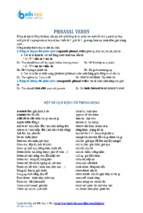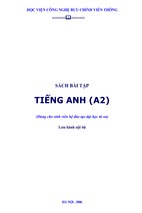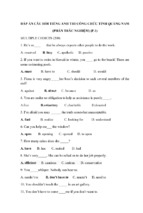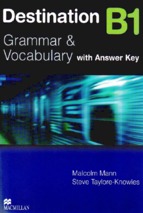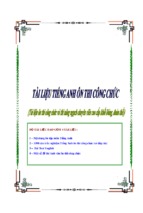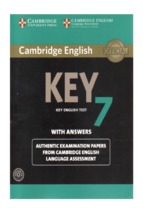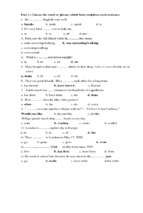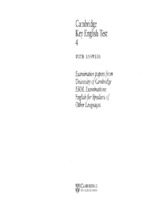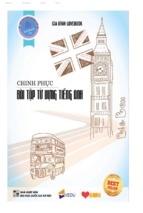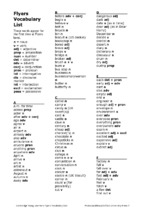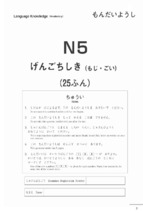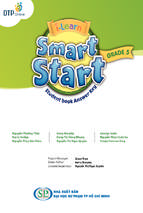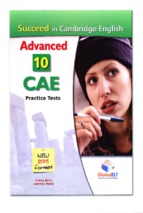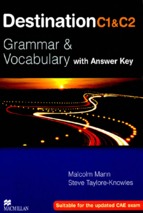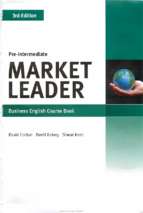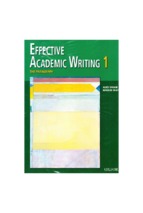37-133-0-p000i-00x.qxd
7/2/04
10:45 AM
Page i
w Book
ie
rv
te
In
e
c
ti
c
Pra
Dear Reader,
th sides of
e be en on bo
I’v
—
ow
kn
I
lt.
difficu
en interInterviews are
ates and I’ve be
id
nd
ca
b
jo
more fun.
interviewed
things that are
y
the desk. I’ve
an
m
of
k
in
ate. You
tly I can th
the job candid
on
viewed. Hones
re
su
es
pr
you are
e’s a lot of
rviewer know
te
in
e
th
Of course, ther
t
le
to
essure
at. Yo u want
also a lot of pr
s
e’
er
th
can attest to th
t
Bu
ate for the job.
person she
the best candid
make sure the
to
ts
l.
an
w
ho
w
wer,
pany in genera
on the intervie
d for the com
an
te
b
si
jo
e
ng
th
ni
r
fit fo
r Plan
aging the Caree
hires is a good
an
m
d
ar
en
he
be
n
e
s I’v
e ofte
In th e si x year
about.com), I’v
g.
in
nn
la
t
rp
os
ee
M
ar
(http://c
e job interview.
on About.com
ed out over th
ss
re
to
st
e
ar
ho
pect an d how
from people w
questions to ex
t
faced
ha
w
ve
ha
ow
kn
ho
people w
om
fr
people want to
l
ai
m
epo in t of
I ge t a lot of
iew. I m ad e a
rv
te
in
answer th em .
an
on
egal questions
at topic.
improper or ill
formation on th
in
300 interview
of
t
lo
a
g
in mind. Ove r
includin
at
th
l
al
ith
w
ok
ht face. Read
I wrote this bo
ything you mig
an
r
fo
u
yo
e
putting
prepar
to guide you in
questions help
em
th
e
us
d
refully an
the answers ca
n responses.
ow
together your
Good Luck!
37-133-0-p000i-00x.qxd
7/2/04
10:45 AM
Page ii
The
Series
Editorial
Publishing Director
Gary M. Krebs
Managing Editor
Kate McBride
Copy Chief
Laura MacLaughlin
Acquisitions Editors
Bethany Brown / Kate Burgo
Development Editor
Christina MacDonald
Production Editors
Jamie Wielgus
Bridget Brace
Production
Production Director
Susan Beale
Production Manager
Michelle Roy Kelly
Series Designers
Daria Perreault
Colleen Cunningham
Cover Design
Paul Beatrice
Frank Rivera
Layout and Graphics
Colleen Cunningham
Rachael Eiben
Michelle Roy Kelly
John Paulhus
Daria Perreault
Erin Ring
Series Cover Artist
Barry Littmann
Visit the entire Everything ® Series at www.everything.com
37-133-0-p000i-00x.qxd
7/2/04
10:45 AM
Page iii
PRACTICE
INTERVIEW
BOOK
Be prepared for any question
Dawn Rosenberg McKay
Adams Media
Avon, Massachusetts
37-133-0-p000i-00x.qxd
9/1/2006
10:47 AM
Page iv
To Dean and Rebecca for their patience.
Copyright ©2004, F+W Publications, Inc.
All rights reserved. This book, or parts thereof, may not be reproduced
in any form without permission from the publisher; exceptions
are made for brief excerpts used in published reviews.
An Everything ® Series Book.
Everything ® and everything.com® are registered trademarks of F+W Publications, Inc.
Published by Adams Media, an F+W Publications Company
57 Littlefield Street, Avon, MA 02322 U.S.A.
www.adamsmedia.com
ISBN 13: 978-1-59337-133-3 (paperback)
ISBN 13: 978-1-60550-466-7(EPUB)
ISBN 10: 1-59337-133-0
Printed in Canada.
J I H G F E D C B A
Library of Congress Cataloging-in-Publication Data
McKay, Dawn Rosenberg.
The everything practice interview book / Dawn Rosenberg McKay.
p.
cm.
ISBN 1-59337-133-0
ISBN 13: 978-1-60550-466-7(EPUB)
1. Employment interviewing. I. Title. II. Series: Everything series.
HF5549.5.I6M327 2004
650.14'4--dc22
2004005401
This publication is designed to provide accurate and authoritative information with
regard to the subject matter covered. It is sold with the understanding that the publisher is not engaged in rendering legal, accounting, or other professional advice. If
legal advice or other expert assistance is required, the services of a competent professional person should be sought.
—From a Declaration of Principles jointly adopted by a Committee of the American
Bar Association and a Committee of Publishers and Associations
Many of the designations used by manufacturers and sellers to distinguish their products are claimed as trademarks. Where those designations appear in this book and
Adams Media was aware of a trademark claim, the designations have been printed
with initial capital letters.
This book is available at quantity discounts for bulk purchases.
For information, call 1-800-289-0963
37-133-0-p000i-00x.qxd
7/2/04
10:45 AM
Page v
Contents
TOP TEN THINGS NOT TO SAY ON A JOB INTERVIEW . . . . . . . . . . . . . . viii
INTRODUCTION . . . . . . . . . . . . . . . . . . . . . . . . . . . . . . . . . . . . . . . . . . . . . . . . ix
C H A P T E R 1: Preparing for the Interview . . . . . . . . 1
Understanding Job Interviews . . . . . . . . . . . . . . . . . . . . . . . . . . . . 1
Learning about Yourself . . . . . . . . . . . . . . . . . . . . . . . . . . . . . . . . 5
Learning about Your Prospective Employer . . . . . . . . . . . . . . . . . . . 8
Doing Your Research . . . . . . . . . . . . . . . . . . . . . . . . . . . . . . . . . 10
Take Time to Rehearse . . . . . . . . . . . . . . . . . . . . . . . . . . . . . . . 13
Access Your Network . . . . . . . . . . . . . . . . . . . . . . . . . . . . . . . . 15
Dealing with Anxiety . . . . . . . . . . . . . . . . . . . . . . . . . . . . . . . . . 16
What to Do about Low Confidence . . . . . . . . . . . . . . . . . . . . . . . 17
The Night Before and Morning of the Interview . . . . . . . . . . . . . . . 18
C H A P T E R 2: First Impressions Count . . . . . . . . . . . 19
What to Wear to the Interview . .
What to Bring to the Interview . .
Getting to the Interview on Time .
Arriving for Your Appointment . . .
The Interview Begins . . . . . . . .
Body Language . . . . . . . . . . . .
Making Your Exit . . . . . . . . . . .
Interviewing over a Meal . . . . . .
Interviewing in a Foreign Country
.
.
.
.
.
.
.
.
.
.
.
.
.
.
.
.
.
.
.
.
.
.
.
.
.
.
.
.
.
.
.
.
.
.
.
.
.
.
.
.
.
.
.
.
.
.
.
.
.
.
.
.
.
.
.
.
.
.
.
.
.
.
.
.
.
.
.
.
.
.
.
.
.
.
.
.
.
.
.
.
.
.
.
.
.
.
.
.
.
.
.
.
.
.
.
.
.
.
.
.
.
.
.
.
.
.
.
.
.
.
.
.
.
.
.
.
.
.
.
.
.
.
.
.
.
.
.
.
.
.
.
.
.
.
.
.
.
.
.
.
.
.
.
.
.
.
.
.
.
.
.
.
.
.
.
.
.
.
.
.
.
.
.
.
.
.
.
.
.
.
.
.
.
.
.
.
.
.
.
.
.
.
.
.
.
.
.
.
.
.
.
.
.
.
.
.
.
.
.
.
.
.
.
.
.
.
.
.
.
.
.
.
.
.
.
.
19
24
24
26
26
28
32
33
36
C H A P T E R 3: Revealing Your Personality . . . . . . . . 37
Why the Personal Questions? . . . . . . . . . . . . . . . . . . . . . . . . . . . 37
Questions and Answers . . . . . . . . . . . . . . . . . . . . . . . . . . . . . . . 39
v
37-133-0-p000i-00x.qxd
7/2/04
10:45 AM
Page vi
THE EVERYTHING PRACTICE INTERVIEW BOOK
C H A P T E R 4: Discussing Your Skills and Abilities 55
Hard Skills . . . . . . . . . . . . . . . . .
Soft Skills . . . . . . . . . . . . . . . . . .
Skills You Haven’t Used Professionally
Questions and Answers . . . . . . . . .
.
.
.
.
.
.
.
.
.
.
.
.
.
.
.
.
.
.
.
.
.
.
.
.
.
.
.
.
.
.
.
.
.
.
.
.
.
.
.
.
.
.
.
.
.
.
.
.
.
.
.
.
.
.
.
.
.
.
.
.
.
.
.
.
.
.
.
.
.
.
.
.
.
.
.
.
.
.
.
.
.
.
.
.
.
.
.
.
55
56
57
58
C H A P T E R 5: Highlighting YourAccomplishments 73
Listing Your Accomplishments . . . . . . . . . . . . . . . . . . . . . . . . . . . 73
Discussing Your Accomplishments . . . . . . . . . . . . . . . . . . . . . . . . 74
Questions and Answers . . . . . . . . . . . . . . . . . . . . . . . . . . . . . . . 76
C H A P T E R 6: Questions about Your Education . . . 91
How You Spent Your College Years . . . . . . . . . . . . . . . . . . . . . . . 91
Questions and Answers . . . . . . . . . . . . . . . . . . . . . . . . . . . . . . . 93
C H A P T E R 7: Discussing Your Work History . . . . 109
How to Present Your Past . . . . . . . . . . . . . . . . . . . . . . . . . . . . . 109
Questions and Answers . . . . . . . . . . . . . . . . . . . . . . . . . . . . . . . 111
C H A P T E R 8: Your Interpersonal Skills . . . . . . . . . 127
An Employee Balancing Act . . . . . . . . . . . . . . . . . . . . . . . . . . . 127
How Do You Resolve Conflicts? . . . . . . . . . . . . . . . . . . . . . . . . . 128
Questions and Answers . . . . . . . . . . . . . . . . . . . . . . . . . . . . . . 130
C H A P T E R 9: Did You Do Your Homework? . . . . . 147
Proving Your Knowledge . . . . . . . . . . . . . . . . . . . . . . . . . . . . . . 147
Highlight Skills That Fit the Company . . . . . . . . . . . . . . . . . . . . . 148
Questions and Answers . . . . . . . . . . . . . . . . . . . . . . . . . . . . . . 150
C H A P T E R 10: What Would You Do
If You Were Hired? . . . . . . . . . . . . . 165
What You Can Bring to a Company . . . . . . . . . . . . . . . . . . . . . . 165
What the Company Expects of You . . . . . . . . . . . . . . . . . . . . . . . 166
Questions and Answers . . . . . . . . . . . . . . . . . . . . . . . . . . . . . . 168
vi
37-133-0-p000i-00x.qxd
7/2/04
10:45 AM
Page vii
CONTENTS
C H A P T E R 11: Questions about
Special Situations . . . . . . . . . . . . . . 183
I Hope They Don’t Ask Me That . . . . . . . . . . . . . . . . . . . . . . . . 183
How to Answer Difficult Questions . . . . . . . . . . . . . . . . . . . . . . . 184
Questions and Answers . . . . . . . . . . . . . . . . . . . . . . . . . . . . . . 186
C H A P T E R 12: Dealing With Illegal Questions . . 201
Who Decides What Questions Are Illegal? . . . . . . . . . . . . . . . . . . 201
The Rules Regarding Specific Issues . . . . . . . . . . . . . . . . . . . . . . 202
Questions and Answers . . . . . . . . . . . . . . . . . . . . . . . . . . . . . . 205
C H A P T E R 13: Behavioral Interviews . . . . . . . . . . 221
What Are Behavioral Interview Questions?
Why Employers Ask Behavioral Questions
How to Answer Behavioral Questions . . .
Questions and Answers . . . . . . . . . . . .
.
.
.
.
.
.
.
.
.
.
.
.
.
.
.
.
.
.
.
.
.
.
.
.
.
.
.
.
.
.
.
.
.
.
.
.
.
.
.
.
.
.
.
.
.
.
.
.
.
.
.
.
.
.
.
.
.
.
.
.
.
.
.
.
.
.
.
.
.
.
.
.
221
222
223
224
C H A P T E R 14: Do You Have Any Questions? . . . . 245
Why You Should Ask Questions . . . . . . . . . . . . . . . . . . . . . . . . . 245
Preparing Your Questions . . . . . . . . . . . . . . . . . . . . . . . . . . . . . 246
Questions You Should Ask (And Not Ask) . . . . . . . . . . . . . . . . . . 248
C H A P T E R 15: What to Do after the Interview . . 257
Thank-You Letters . . . . . . . .
What to Do If You Don’t Want
Waiting for a Decision . . . . .
The Job Offer—Finally . . . . .
......
the Job
......
......
.
.
.
.
.
.
.
.
.
.
.
.
.
.
.
.
.
.
.
.
.
.
.
.
.
.
.
.
.
.
.
.
.
.
.
.
.
.
.
.
.
.
.
.
.
.
.
.
.
.
.
.
.
.
.
.
.
.
.
.
.
.
.
.
.
.
.
.
.
.
.
.
.
.
.
.
.
.
.
.
257
265
269
270
A P P E N D I X A : R E S O U RC E S . . . . . . . . . . . . . . . . . . . . . . . . . . 271
A P P E N D I X B: G LO S S A RY . . . . . . . . . . . . . . . . . . . . . . . . . . . 281
I N D E X . . . . . . . . . . . . . . . . . . . . . . . . . . . . . . . . . . . . . . . 287
vii
37-133-0-p000i-00x.qxd
7/2/04
10:45 AM
Page viii
Top Ten Things
Not to Say on a Job Interview
1. That suit looks expensive! How much money do you
make, anyway?
2. What would my salary be? I have to make more than I
did at my last job.
3. I’ve never heard of your company before. What type of
business is this?
4. It wasn’t my fault. My coworkers had it in for me.
5. My boss was a jerk. I didn’t have to think twice about
quitting after what he did.
6. How much time do you give for maternity leave?
7. How many vacation days will I have each year? I love to
travel. I was thinking of Australia next year.
8. If someone files a harassment charge against me,
you would cover for me, right?
9. I’d rather be working in my own field, but I can’t find
anyone who will hire me, so this will do for now.
10. Can I have my own office? I really don’t like working
with other people.
viii
37-133-0-p000i-00x.qxd
7/2/04
10:45 AM
Page ix
Introduction
WOULDN’T IT BE NICE IF YOU COULD send out your resume
for a position you’re qualified for and simply be offered a job?
After all, everything about you is right there on your resume, isn’t
it? You should know—you put it there yourself.
But, no, everything about you is not on your resume. Think
of your resume as a pencil drawing of who you really are. There
is no dimension to it. It has no color and no expression.
Basically, it’s pretty flat. Not at all like you; you are multifaceted.
You’ve made choices throughout your career. You reached certain
goals and had many accomplishments. You should have a chance
to talk about all of that, because those details are what will make
an employer want to hire you.
The job interview is your chance to show your prospective
employer who you really are and what you can bring to the position. By asking you questions, a prospective employer can learn
all about you and why you made the choices you made. He can
discover what motivates you and what makes you proud. The
interviewer can find out how you will fit in with his company. Will
you get along with other employees? Will you make important
contributions to his organization?
There is a lot to accomplish during the job interview. It is perhaps the most important part of the entire job search process. It
is also the most difficult part of the entire job search process. It’s
not like the resume you spent months poring over. You can edit
your resume again and again until it lists the most important
things about your career, using the most effective wording to highlight your skills. However, a job interview usually takes place in
under an hour. When you say something, there’s no delete key.
If you forget to say something, the moment may have already
passed by the time you realize it. You can’t just insert it.
ix
37-133-0-p000i-00x.qxd
7/2/04
10:45 AM
Page x
THE EVERYTHING PRACTICE INTERVIEW BOOK
That is why it is so very important that you prepare well for
the job interview. You won’t have another chance to get it right,
at least not with the same employer. The more comfortable you
are with the entire process of interviewing, the more relaxed you
will be when it comes time for the interview, and the better the
interview will be.
This book will guide you through the entire job interview
process. The first two chapters cover everything you need to do
before the interview takes place. Discover what you need to do
to prepare for a job interview. Learn how to research a prospective employer so you can intelligently ask and answer questions
during your interview. Find out how to dress for an interview.
Learn about interviewing in another country.
Next up are twelve chapters that are packed full of sample
job interview questions. For each question there is a great
answer, an explanation of why you should give that answer, and
then an answer you should never give and the reason why. As
you go through the questions, think of how you would personalize each answer.
The final chapter deals with the aftermath of the job interview.
Find out what you need to do to follow up on a job interview. Is
a thank-you letter really necessary? Of course, the whole purpose
of this entire process is to get a job offer. Find out how to negotiate, accept, or reject one. By the time you’re finished with this
book, you’ll be able to take on even the toughest interview.
x
37-133-0-p001-294.qxd
7/2/04
10:48 AM
Page 1
CHAPTER 1
Preparing for
the Interview
MANY PEOPLE FOLLOW A CERTAIN ROUTINE when they
are job hunting. They send copies of their resumes to prospective
employers and follow that with weeks of sitting around waiting to be
called back. You should let your competition follow that routine—you
can make much better use of your time! By preparing for a job interview in advance, you will increase your chances of getting hired
when you finally do get that call.
Understanding Job Interviews
Before you begin interviewing, you must make sure you have a
good understanding of what interviews are all about. You should
know about the interview process, what the different types of interviews are, and what employers are trying to learn about you from
an interview. Becoming more knowledgeable about what to expect
will help you demystify the entire interview process. This in turn
will allow you to feel more confident when you are on a job interview. Remember, the more confident you feel, the more confident
you will look to your potential boss.
The Purpose of the Interview
Have you ever wondered what the point of a job interview
even is? The employer has your resume—can’t she just look at it
to see whether you have the necessary skills and experience? All
she should need to do is make a phone call or two to verify that
1
37-133-0-p001-294.qxd
7/2/04
10:48 AM
Page 2
THE EVERYTHING PRACTICE INTERVIEW BOOK
information, right? While it is made up of information about your
past experience, your resume doesn’t give the employer a full picture of who you are. Your resume is only a summary of your skills,
work experience, and educational background. With only your
resume to rely on, the person interviewing you won’t have any
idea of the specific things about you that will set you apart from
the other candidates.
After all, a resume is merely a piece of paper and you are so
much more than that. An interviewer can’t learn about someone’s
personality by looking at a resume. She can’t discover how a candidate developed some of his skills or which accomplishments
meant the most to him. The interviewer can’t find out how the
candidate reacts to change or adversity by reading his resume.
The only way an interviewer can learn any of those things
about a job candidate is by talking to him and asking questions.
This will allow the candidate to paint a picture of himself that is
much more elaborate than what can fit on one sheet of paper.
ESSENTIAL
Remember that the interview is your chance to embellish the
facts you listed on your resume. Rather than looking at an
interview as an inquisition, you should instead look at it as a
wonderful opportunity to express your true self to your
prospective employer.
Another purpose of a job interview is to help you to learn
about the employer. You will discover things on a job interview
that will allow you to make an informed decision about whether
to accept or reject an offer, should the employer make one. You
will learn some things about the employer by asking questions.
You will also learn things about the employer from the questions
she asks you. For example, if the interviewer starts asking questions about working late or traveling, you can safely assume that
these things will be part of your life should you be hired.
2
37-133-0-p001-294.qxd
7/2/04
10:48 AM
Page 3
P R E PA R I N G F O R T H E I N T E R V I E W
You may decide by the end of a job interview that this isn’t
really the job for you or that this company isn’t one you want to
work for. And that’s okay. It is in everyone’s best interests, both
the employer’s and yours, to make this determination before you
accept a job offer and begin working.
ALERT!
If you decide at the end of a job interview that you don’t want
to work for the employer, don’t say anything just yet. Wait
twenty-four hours before you let the employer know of your
decision. After thinking it over, you may change your mind.
The Interview Process
The interview process can go on for quite a while. First, you
may be asked to come in for a screening interview. The screening
interview is your first interview with a particular employer. In
some cases it may even take place over the telephone. During a
screening interview, the person interviewing you (usually someone
who works in the human resources department) will want to
verify items that are on your resume, such as dates of employment, schooling, etc.
If the person who completes your screening interview is satisfied, he will most likely set up a selection interview. While
someone from human resources may interview you again at this
point, it is also likely that a department manager will interview
you. The department manager, in addition to making sure you
have the desirable skills and background, will want to make sure
you have the right personality for the position.
Following the first selection interview, the employer may ask
you to come back for subsequent interviews. During these further
interviews, the employer may want to introduce you to other people
in the company to make sure you are the right choice. Remember,
you are still in the interviewing phase, so be on your best behavior.
3
37-133-0-p001-294.qxd
7/2/04
10:48 AM
Page 4
THE EVERYTHING PRACTICE INTERVIEW BOOK
The employer may call back other candidates as well, as she
tries to narrow down her choices. Sometimes you will be the only
candidate who is asked to return for more interviews. That usually is good news, but don’t consider it a done deal until you
actually have a job offer.
QUESTION?
What should I discuss on a second interview?
Use this opportunity to bring up something that you didn’t
get to talk about during the initial interview. Be prepared
with an example of a specific skill or achievement you didn’t
have a chance to highlight before. Remember to explain how
the example shows that you are a good candidate for the
particular position you want.
Preparing to Answer Questions
You will be asked a variety of questions on a job interview.
These questions will pertain to your skills and abilities, accomplishments, education, and work history. You will also be asked
questions about your strengths and weaknesses, your interests and
hobbies, and your likes and dislikes, all of which will allow the
employer to learn about your personal traits or characteristics.
In Chapters 3 through 13 you will find questions you might
encounter on a job interview. While answers (both good and
bad) are given, they are only a guideline. You should try to
figure out how you will answer those questions. While you
should not go into a job interview with a memorized script, you
should have an idea of how you will answer most questions that
will come your way. Chapter 14 will give you ideas for the types
of questions you should ask the interviewer. Use these questions
in the same way—as a guideline to be adapted to your particular situation and the company and industry you are interviewing with.
4
37-133-0-p001-294.qxd
7/2/04
10:48 AM
Page 5
P R E PA R I N G F O R T H E I N T E R V I E W
Special Types of Interviews
At some point during your job search, you may find that you
have to participate in a group interview. This means several candidates will be interviewed at one time. A group interview allows
those who are natural leaders to show themselves, and often the
purpose of this type of interview is to find out who stands out
from the crowd or emerges as a leader. If you aren’t a leader,
don’t worry—not everyone can be. The job may simply not be
the right one for you. Trying to be someone you’re not will only
make things difficult down the line, when you or your employer
discover that you’re not the right fit after all.
If you walk into an interview and find yourself sitting at a table
opposite several people, don’t be alarmed. You are about to take
part in a panel interview. This type of interview is also known as
a committee interview and is often used when a group of people
must collectively decide who to hire. During a panel interview,
each member of the panel will ask you questions. The best thing
you can do in this situation is stay calm and take the questions
one at a time.
ESSENTIAL
During a panel interview, several people may be firing
questions off at once. Listen carefully, but if you don’t hear
the question, politely ask the person who asked it to repeat
herself. When answering questions during a panel interview,
directly address the person who asked the question by
making eye contact with her.
Learning about Yourself
Your goal on a job interview is to give the best answers you can
possibly give. In order to do that there’s someone you need to get
to know—yourself. You probably worked hard at putting together a
great resume that highlights your skills, accomplishments, and
5
37-133-0-p001-294.qxd
7/2/04
10:48 AM
Page 6
THE EVERYTHING PRACTICE INTERVIEW BOOK
experience. This was time well spent, since a great resume will
help you line up the right inter view, but there is
only so much that will come across in a resume. You need to
uncover what is behind that basic outline so you can present it to
the interviewer and show him what an excellent candidate you
really are.
Be Specific
On a job interview you will be asked questions about your
skills, for example. Of course, you know what skills you have, but
can you discuss how you acquired them? What if you’re asked
about your accomplishments? You’ve no doubt accomplished a lot
at work, but can you recall specifics? You need anecdotes that
clearly back up your claims, so it is imperative that you think back
in advance and have some good examples of your strengths ready
when the subject comes up.
Go Beyond the Resume
The interviewer will likely use your resume to guide him
through the interview. You should be intimately familiar with each
item you have listed on it. Study your resume before you go out
on an interview. You must be prepared to talk about and elaborate on everything that is on it.
FACT
Interviewers generally expect more than yes or no answers to
their questions. You must give details that clearly explain your
answer. When an interviewer asks you to discuss a particular
situation, be ready to give examples.
Sit down with a clean copy of your resume and a notebook
in front of you. Now, one at a time, look at each job you have
listed on your resume and think about it carefully. What do you
remember about the job? Do you remember why you started
6
- Xem thêm -

